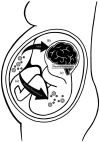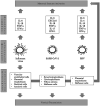Impact of respiratory viral infections during pregnancy on the neurological outcomes of the newborn: current knowledge
- PMID: 38260010
- PMCID: PMC10800711
- DOI: 10.3389/fnins.2023.1320319
Impact of respiratory viral infections during pregnancy on the neurological outcomes of the newborn: current knowledge
Abstract
Brain development is a complex process that begins during pregnancy, and the events occurring during this sensitive period can affect the offspring's neurodevelopmental outcomes. Respiratory viral infections are frequently reported in pregnant women, and, in the last few decades, they have been related to numerous neuropsychiatric sequelae. Respiratory viruses can disrupt brain development by directly invading the fetal circulation through vertical transmission or inducing neuroinflammation through the maternal immune activation and production of inflammatory cytokines. Influenza virus gestational infection has been consistently associated with psychotic disorders, such as schizophrenia and autism spectrum disorder, while the recent pandemic raised some concerns regarding the effects of severe acute respiratory syndrome coronavirus 2 on neurodevelopmental outcomes of children born to affected mothers. In addition, emerging evidence supports the possible role of respiratory syncytial virus infection as a risk factor for adverse neuropsychiatric consequences. Understanding the mechanisms underlying developmental dysfunction allows for improving preventive strategies, early diagnosis, and prompt interventions.
Keywords: influenza virus; maternal infection; neurodevelopmental outcome; respiratory syncytial virus; respiratory viral infections; severe acute respiratory syndrome coronavirus 2.
Copyright © 2024 Manti, Spoto, Nicotera, Di Rosa and Piedimonte.
Conflict of interest statement
The authors declare that the research was conducted in the absence of any commercial or financial relationships that could be construed as a potential conflict of interest. The author(s) declared that they were an editorial board member of Frontiers, at the time of submission. This had no impact on the peer review process and the final decision.
Figures



References
-
- Aldrete-Cortez V., Bobadilla L., Tafoya S. A., Gonzalez-Carpinteiro A., Nava F., Viñals C., et al. . (2022). Infants prenatally exposed to SARS-CoV-2 show the absence of fidgety movements and are at higher risk for neurological disorders: a comparative study. PLoS One 17:e0267575. doi: 10.1371/journal.pone.0267575, PMID: - DOI - PMC - PubMed
Publication types
Grants and funding
LinkOut - more resources
Full Text Sources

